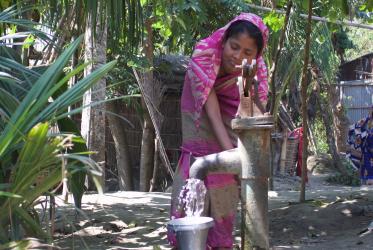Displaying 1 - 20 of 34
New WCC “Eco Ambassadors” pledge to protect our ecology
06 January 2020
Eco-School promotes blue communities, green churches
19 November 2019
WCC Eco-School begins in Thailand
07 November 2019
WCC condemns massacre of farmers in Philippines
12 April 2019
All pilgrim routes lead to COP24
11 December 2018
#WCC70: Ein Gebet für Gesundheit und Heilung
20 July 2018
#WCC70: A prayer about health and healing
20 July 2018
“Overcoming economic injustice” vision of WCC’s Athena Peralta
23 February 2017
New videos help congregations hasten HIV response
20 October 2016









